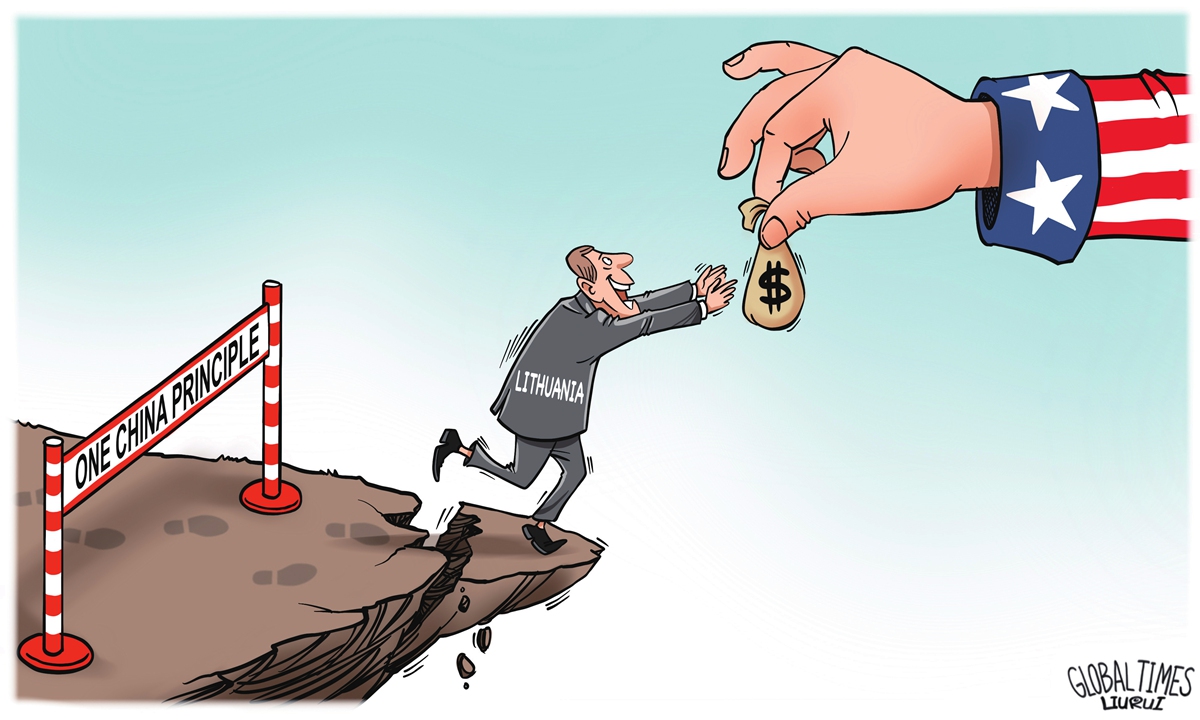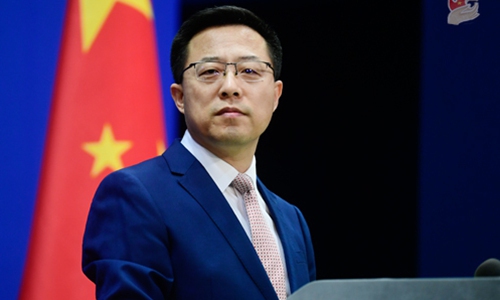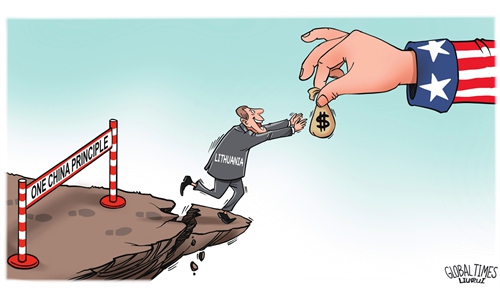
Gambling on crumbs from the US' table Illustration: Liu Rui/GT
The problem with Lithuania is that it is not a country but a geographical destination with a very limited sovereignty and almost no place in the international competitive environment. Such a small territory can pretend to exercise a foreign policy and even maintain relationships with the established international players.But it has serious problems with taking responsibility for its own actions and believes that it is not vulnerable to any consequences which can follow. This irresponsibility problem extends to its recent decisions to establish "formal" links to the Taiwan island, flouting the internationally recognized "One-China" principle. As well, it includes the previous attempts of the Lithuanian government to antagonize Russia in every direction.
The sources of such conduct are relatively simple even though the recent actions of the Lithuanian government cannot be justified or even understood by many. However, to understand the best future course of action one needs to address the reasons for the problem and the limits we fill face dealing with some particular partners.
We in Russia have certain experiences in having to deal with our small neighbours in Eastern Europe and know that rational arguments or economic interdependence do not always work. History and geography also matter.
Lithuania has lost its independence to Poland at the end of the 15th century and until the beginning of the 21st century it did not know the experience of living on its own. Later, in the second part of the 18th century this territory became a fragment of the Russian empire as a part of the polish lands.
Soon after it was granted independence following the Russian revolution, it lost its capital Vilnius to its long-time enemy Poland and the country's only university was for the next years located in the neighbouring state. Back in 1940 Lithuania once again became a part of Russia, then USSR, where it enjoyed special treatment.
The soviet authorities closed their eyes to many particularities of the local political and intellectual life. To conclude we can see that Lithuania basically did not have a chance to learn what is to be a sovereign nation and bear sole responsibility for its own actions. At the same time the local elite developed a very special attitude to the outside world, and especially toward the bigger nations.
Almost all local decision-makers believe that big countries are indebted to Vilnius authorities just by definition. Living in China and even in Russia it is really difficult to understand the psychology of this state smaller then a tiny Chinese regional city. But while those living in small Chinese towns understand they belong to a great nation, for the Lithuanian politicians the world ends just outside the gate.
After this country joined the European Union - a grouping of states headed by the economic giant Germany - Lithuania lost almost one-third of its initial population which relocated to the Western European countries as permanent labour migrants. The educational system is down and the economy is relatively perishing due to the hard conditions of the EU common market. The country is governed partly by the representatives of its former pro-Russian nomenklatura or descendants from the Lithuanian diaspora in the USA or Canada.
Recent conflict with the neighbouring Belorussia led to a sharp decrease of international trade via Lithuanian ports on the Baltic Sea. It also closed its airspace for civilian airplanes which crossed through the Belorussian sky thus making many people in Europe and Russia fly longer and pay higher prices for tickets.
Because of these actions Lithuanian authorities have nothing to sell but their loyalty to the US and the country's formally independent status. These can be sold to territories which might reward diplomatic ties with a certain limited amount of cash.
China apparently believes that no individual or nation is hopeless and this is a great strength of the Chinese people and government. However, in certain cases the problem of irresponsible behaviour lies in the very nature of statehood. The ability to rationally assess the consequences needs to be based on a rational attitude to one's own geopolitical and geo-economic position. But such rational behaviour is a quality of the genuinely sovereign state and we really need to do a lot of work to cultivate it in partners who do not want to be truly independent.
The author is Moscow-based Valdai Club programme director. opinion@globaltimes.com.cn



